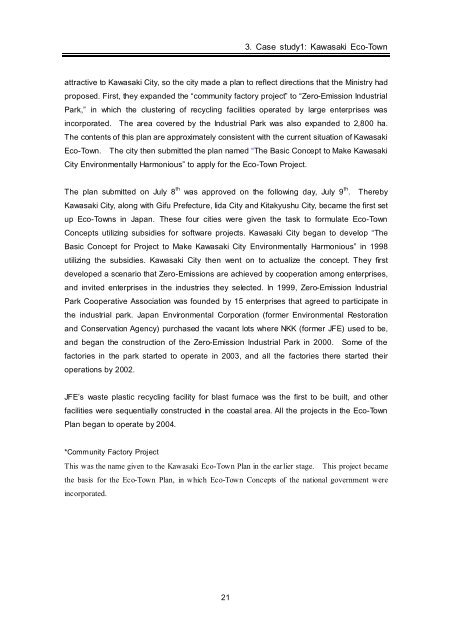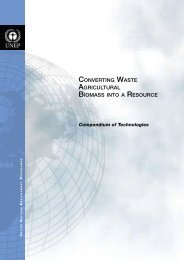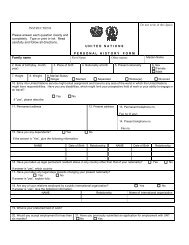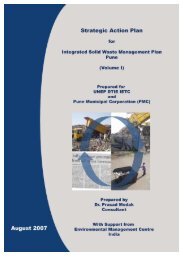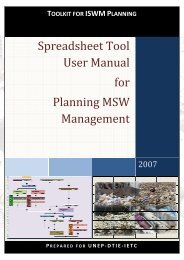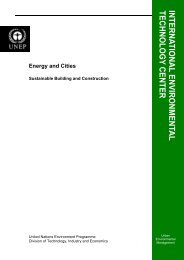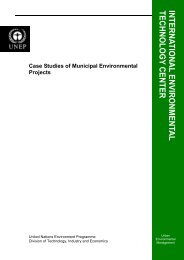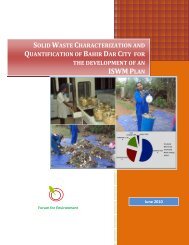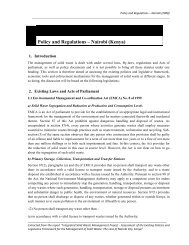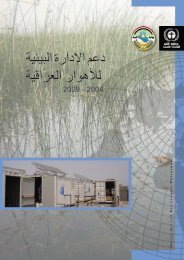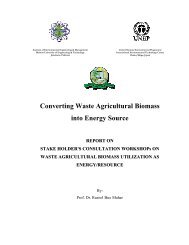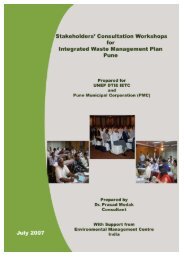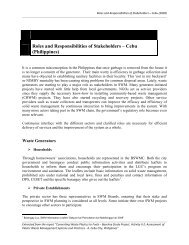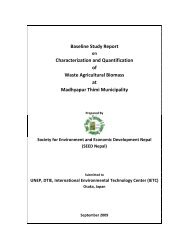Research on Eco-Towns in Japan - UNEP
Research on Eco-Towns in Japan - UNEP
Research on Eco-Towns in Japan - UNEP
Create successful ePaper yourself
Turn your PDF publications into a flip-book with our unique Google optimized e-Paper software.
3. Case study1: Kawasaki <strong>Eco</strong>-Town<br />
attractive to Kawasaki City, so the city made a plan to reflect directi<strong>on</strong>s that the M<strong>in</strong>istry had<br />
proposed. First, they expanded the “community factory project” to “Zero-Emissi<strong>on</strong> Industrial<br />
Park,” <strong>in</strong> which the cluster<strong>in</strong>g of recycl<strong>in</strong>g facilities operated by large enterprises was<br />
<strong>in</strong>corporated. The area covered by the Industrial Park was also expanded to 2,800 ha.<br />
The c<strong>on</strong>tents of this plan are approximately c<strong>on</strong>sistent with the current situati<strong>on</strong> of Kawasaki<br />
<strong>Eco</strong>-Town. The city then submitted the plan named “The Basic C<strong>on</strong>cept to Make Kawasaki<br />
City Envir<strong>on</strong>mentally Harm<strong>on</strong>ious” to apply for the <strong>Eco</strong>-Town Project.<br />
The plan submitted <strong>on</strong> July 8 th was approved <strong>on</strong> the follow<strong>in</strong>g day, July 9 th . Thereby<br />
Kawasaki City, al<strong>on</strong>g with Gifu Prefecture, Iida City and Kitakyushu City, became the first set<br />
up <strong>Eco</strong>-<strong>Towns</strong> <strong>in</strong> <strong>Japan</strong>. These four cities were given the task to formulate <strong>Eco</strong>-Town<br />
C<strong>on</strong>cepts utiliz<strong>in</strong>g subsidies for software projects. Kawasaki City began to develop “The<br />
Basic C<strong>on</strong>cept for Project to Make Kawasaki City Envir<strong>on</strong>mentally Harm<strong>on</strong>ious” <strong>in</strong> 1998<br />
utiliz<strong>in</strong>g the subsidies. Kawasaki City then went <strong>on</strong> to actualize the c<strong>on</strong>cept. They first<br />
developed a scenario that Zero-Emissi<strong>on</strong>s are achieved by cooperati<strong>on</strong> am<strong>on</strong>g enterprises,<br />
and <strong>in</strong>vited enterprises <strong>in</strong> the <strong>in</strong>dustries they selected. In 1999, Zero-Emissi<strong>on</strong> Industrial<br />
Park Cooperative Associati<strong>on</strong> was founded by 15 enterprises that agreed to participate <strong>in</strong><br />
the <strong>in</strong>dustrial park. <strong>Japan</strong> Envir<strong>on</strong>mental Corporati<strong>on</strong> (former Envir<strong>on</strong>mental Restorati<strong>on</strong><br />
and C<strong>on</strong>servati<strong>on</strong> Agency) purchased the vacant lots where NKK (former JFE) used to be,<br />
and began the c<strong>on</strong>structi<strong>on</strong> of the Zero-Emissi<strong>on</strong> Industrial Park <strong>in</strong> 2000. Some of the<br />
factories <strong>in</strong> the park started to operate <strong>in</strong> 2003, and all the factories there started their<br />
operati<strong>on</strong>s by 2002.<br />
JFE’s waste plastic recycl<strong>in</strong>g facility for blast furnace was the first to be built, and other<br />
facilities were sequentially c<strong>on</strong>structed <strong>in</strong> the coastal area. All the projects <strong>in</strong> the <strong>Eco</strong>-Town<br />
Plan began to operate by 2004.<br />
*Community Factory Project<br />
This was the name given to the Kawasaki <strong>Eco</strong>-Town Plan <strong>in</strong> the earlier stage. This project became<br />
the basis for the <strong>Eco</strong>-Town Plan, <strong>in</strong> which <strong>Eco</strong>-Town C<strong>on</strong>cepts of the nati<strong>on</strong>al government were<br />
<strong>in</strong>corporated.<br />
21


